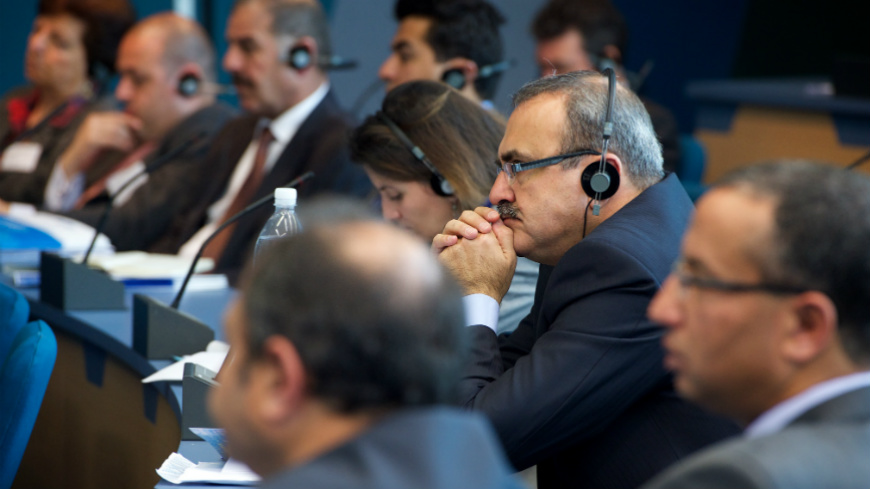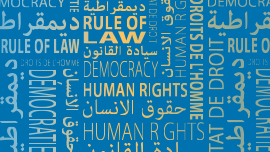Fostering a better regional cooperation between the two shores of the Mediterranean in the fields of human rights, the rule of law and democracy

Launch event of the South programme II, 10 April 2015, Strasbourg
South Programme II aims to raise the level of partner countries' engagement in the field of human rights, democracy and the rule of law protection through the exchange of best practices on a peer-to-peer level between all partners from the region and between Europe and the region.
The Programme seeks the progressive involvement of Southern Mediterranean partners in formal and informal Council of Europe networks at intergovernmental, interparliamentary and local levels. Through the exchange of best practices in the framework of these networks, the South Programme II is contributing to the spread of knowledge of the Council of Europe “legal acquis” composed of its conventions and agreements, recommendations and resolutions from the various Council of Europe bodies across the Southern Mediterranean region.
The numerous networking opportunities for peer work of experts from both Europe and the Southern Mediterranean can also function as a catalyst for reforms at the national and regional level on major human rights and the rule of law issues, in accordance with the best European practices.
The Council of Europe has therefore endeavoured to take benefit of the specific experience of Council of Europe member states that have gone through transition processes over the last decades, in particular, the countries from Central and Eastern Europe. These countries have carried out comprehensive reforms in the field of democratic governance after the fall of the Berlin wall in 1989. Their valuable experience is being today transferred to the Southern Mediterranean partners according to their specific needs and challenges.
Some examples of networks having successfully functioned under the South Programme I can be highlighted in this respect:
- The first ever Schools of Political Studies (SPS) in non-member states of the Council of Europe were created in Tunisia and Morocco under South Programme I. The Tunisian and Moroccan Schools of Political Studies today fully participate on an equal footing in the Council of Europe network of SPS across Europe.
- The MedNet network of the CoE Pompidou Group promoting regional cooperation in the field of combating drug trafficking and abuse has achieved concrete results under the first phase of the South programme, namely the launching of monitoring Observatories on drugs and addiction in Morocco and Tunisia.
- The regular participation of parliamentary delegations from Southern Mediterranean partners to Council of Europe existing network of Parliaments of 47 Council of Europe member states (Parliamentary Plenary Sessions and thematic workshops organised by the Parliamentary Assembly of the Council of Europe (PACE)) has been institutionalised through the Partner for Democracy Status. The status has been granted to the Parliament of Morocco and requested as well by the Parliament of Jordan.
- The participation of Southern Mediterranean experts to Council of Europe intergovernmental committee meetings in priority areas (such as Legal Cooperation, Fight against Corruption, Gender Equality Commission, Children Rights), which has allowed experts from the region to hold exchanges of views on a regular basis with European experts in key areas relating to their reform agendas. Involving representatives from partner countries in the on-going work of the Organisation has become a rule since the beginning of the South Programme II. It is based on the enhanced political dialogue adopted by the Committee of Ministers of the Council of Europe and welcomed by the Southern Mediterranean partners.
- The organisation of the first Venice Academy on Human Rights, in collaboration with the European Inter-University Centre for Human Rights and the Venice International University, to train South Programme target groups on human rights and the rule of law issues. The success of this initiative under South Programme I should allow to enlarge the project to make sure it will comprehensively address human rights education and target appropriate groups, and to expand it to other countries of the region.
The South Programme II intends to continue making good use of all networking opportunities to catalyse a change aiming to create an enabling environment for the values of human rights, the rule of law and democracy, thus consolidating ongoing democracy processes around shared values.
 Latest news
Latest news
 Related links
Related links
Council of Europe
CoE and the Southern Neighbourhood
Office of the Directorate General of Programmes










